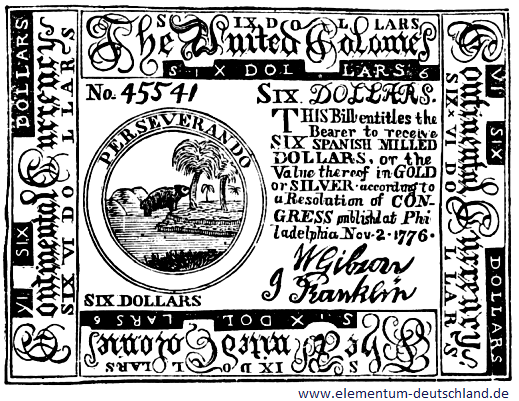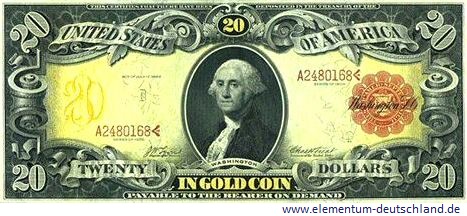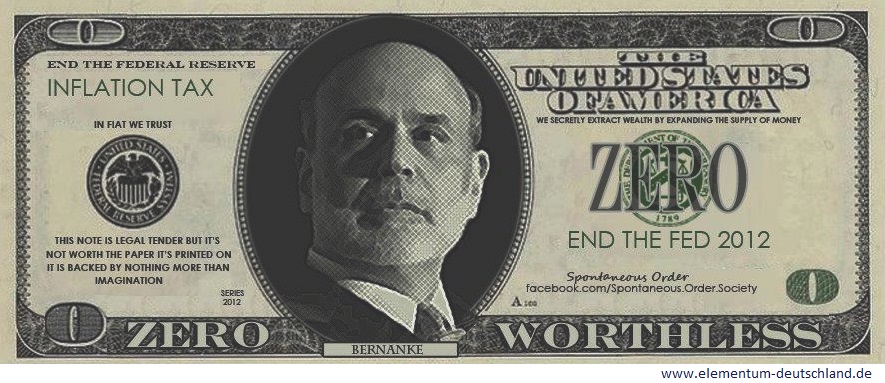Introduction
Paper money was invented when payments were done in gold and silver. Instead of carrying the heavy and precious metals around, one could store them in a warehouse. In return, a piece of paper was handed out whose owner was entitled to pick up the stored metals. Since the paper was backed in earnest with real valuables and thus being effectively redeemable, it was accepted everywhere – just like physical gold and silver – as a common means of payment.
The banker was born when it was noticed that relatively few came to actually pick up their metals (thanks to trust in a completely backed paper money system). Instead of hoarding the metals like “dead capital” in vaults, it offered itself to work with them and bring into circulation more paper money than real assets actually in stock.
As a matter of fact, the price for such monetary politics still is and remains inflation; respectively, the “missing amount” is collected/encashed practically from all paper money owners even-handedly over time automatically in a creeping to galloping manner, temporarily even hyperactively.
In September 2012, the German newspaper Bild headlined, typically rather big, on its cover “Bank Notes are Printed Paper”, quoting the recent statements from German central bank’s president, Jens Weidmann, who even blew this gaff:
“Today’s paper money is no longer backed by any kinds of material/real assets… The connoisseurs among you know that the Euro actually constitutes cotton.”
Our paper money system today is not based on gold and silver anymore, but solely on trust.
If trust fades away or threats of inflation appear on the horizon, only real (“intrinsic”) assets, like gold and silver, provide effective protection.

How to best buy, store and sell your precious metals
If you decide in favor of gold and silver, firstly the questions about purchasing, storing, security and sale arise. Some answers:
- Due to the risk of theft or seizure, storing metals physically at home or at a bank is not recommended as a matter of principle.
- Store your wealth, poured into precious metals, only at a secure, independent and easily accessible place outside the banking system (ideally far away from urban agglomerations, city centers and airports).
- Make inquiries about the security level of the vaulting facility. For example, the high-security vaulting facility within the St. Gotthard Mountain-Massif in central Swiss Alps offers the highest possible security level 13 and hence belongs to the most secure vaults in the world with only Fort Knox having the reputation of being even more secure.
- Without fail, find about if the physical inventory (that should take place multiple times during the year) is based on the so-called “Six-Eye-Principle”:
- Not only the operator of the vaulting facility and a trustee certify your holdings, but these are also certificated by an independent and renowned auditing firm
- Most importantly, this certification must be on your name (only chance to make sure that you are the actual and sole owner).
- Explicitly, your metals should not be loanable (leasing) or used as collateral – nobody should be allowed to use (“work with”) your metals without your knowledge and written consent.
Tax-free profits can be realized already after a minimum holding period of 12 months (e.g. Germans), however only if you are the sole owner of the metals.
- In contrast to gold, there is VAT on silver in many countries (e.g. 19% in Germany) – duty-free warehouses and zones offer to avoid this tax hence enabling you to purchase 19% more silver on which price profits are realizable additionally.
- The bigger the bullion bar, the more metal you (should) get for your money; around 10% price advantage with 15 kg silver bars against small bars.
- In order to eliminate the risk of counterfeit, the bars must be of highest quality standard respectively with an internationally accepted hallmark (“Good Delivery”) originating from a renowned refinery (e.g. Umicore, Degussa).
Pay attention forcefully that it is possible without much hassle to physically inspect and pick up your belongings within the vault in case you want to stop the storage.
- Furthermore, the custodian should also offer to deliver your metals to a worldwide locality as per your demand taking care of the full organizational process, such as documentation, customs clearance, insurance, and logistics.
- Hence, the storage should be cancelable anytime and with immediate effect.
- It would be a great advantage if you are not only able to buy and store precious metals low-priced directly from the operator of the high-security storing facility, but as well enjoy their guarantee of buying your metals anytime at current metals prices plus a low commission – so that you do not have to look for a buyer yourself in case you want to sell and convert back into paper money that will be wire-transferred to any bank account in the world.This is a very important point as if you were to take out the metals from the duty-freezone, you not only must pay VAT on silver, but more crucially you must take into account that your buyer may charge high melting costs to make sure genuineness. Metals that are stored in a high-security vaulting facility in a duty-freezone can be sold much closer to the actual metals spot price, because the authenticity of the metals has been certified as not having left “the circle of trust”.
Thus, it is much cheaper to buy and sell physical metals in a trading freezone outside the banking system.
- The storage fees must be transparent and in step-like arrangement with stored quantities or values.
- Also, the fees that are based on the market value of your holdings should not be oriented on a single due/ effective/ valuation date, but calculated according to the average market price during time of storage.
-When buying and selling your metals, you should be included into the price fixing process thus enabling you to fix spot prices precisely.
While central banks worldwide have not stopped to print more unbacked paper money, Germany`s central bank, the Deutsche Bundesbank, already gave an official buy recommendation for gold in late 2012 via its President Jens Weidmann. If you also buy, store, take delivery or sell physical gold and especially silver, do so correctly.
.jpg)
Background
Dr. Jens Weidmann, President of the German central bank, in a welcome speech (title “Paper Money - Government Financing – Inflation”) on the occasion of the 18th Colloquium by the IBF (Institute für bankhistorische Forschung; Institute for Bank-historic Research) on September 18, 2012:
“To bring back memories, the money creation scene in the first act of (J. W. Goethe`s) Faust II is recalled briefly.
Mephisto, disguised as a jester, speaks with the Kaiser/emperor who is bedeviled by acute shortage of money and states:
„Where in the world we do not miss anything? One lacks this, another that, but here money is absent.”
Eventually, the Kaiser responds back to Mephisto`s astute persuasion efforts:
„I am fed up with the perpetual How and When; Money is missing, well, go ahead and create it.”
Mephisto answers:
„I create what you want and I create more.“
He succeeds in making the Kaiser sign a certificate in midst the hustle and bustle of the nightly masked ball which he duplicates overnight and subsequently spreading them as paper money.
The involved parties are enamored by the initial success of this course of action. The chancellor announces in full of joy:
„Listen and look at this fateful piece of paper (meaning the newly created paper money)
– that has transformed all woes into weal.”
He reads:
“´Everybody has to know who wants it: This paper here is worth a thousand Kronen.´Â”
Mephisto further fans the joyousness when saying shortly thereafter:
“Such a paper, instead of gold and pearls,
Is so comfortable, one knows for sure what one has;
One does not need to first market nor trade,
One can inebriate as per gusto in love and wine.”
The involved parties are so delighted about the assumed benefaction that they do not suspect the development to slip out of their hands losing control:
Yet the country in Faust II was able to get rid of its debts in a first step, while private consumption rose strongly powering a boom and economic revival.
In due course, however, the goings-on get out of hand and into inflation, and the money system gets destroyed in consequence to the rapid depreciation of money.
It is awe-inspiring that and how Goethe in Faust II illuminates the potentially dangerous connection between money creation, government financing and inflation – and thus a core problem of unbacked currency regimes. This is true even if against fact that, as a general rule, Faust and Goethe are not associated directly with economic contexts, especially not with such an area of conflict in monetary politics.
That Faust can very well be interpreted economically, Prof. Adolf Hüttl has shown among others. He is the former Vice-President of the Federal Reserve Bank of Hessen (Germany) and to my great joy among us here today. As early as 1965, he wrote in the employee-magazine of the Bundesbank a quite insightful text under the headline “The Money in Goethe`s Faust II” (“Das Geld in Goethes Faust II”).
Prof. Hans Christoph Binswanger, who is among us here today as well to my great joy and who was teaching in Sankt Gallen (Switzerland), undertook a similar approach and published a book with the title “Money and Magic – Interpretation and Critics of modern economy based on Goethe`s Faust” (“Geld und Magie – Deutung und Kritik der modernen Wirtschaft anhand von Goethes Faust”).
The key assumption of Binswanger was that Goethe portrayed modern economy, including money creation, as a continuation of alchemy with different means. While classic alchemist tried to make gold out of lead, money is made of paper in modern economics.
Indeed, the circumstance that central banks can effectively create money out of nothing may appear to many observers as something surprising, peculiar, may be even mystical, dreamlike – or also nightmarish.
Because when central banks virtually can create unlimited money out of nothing, how can be made sure that money is sufficiently scarce and thus holds value?
Does the possibility of creating money more or less freely not bring along the temptation to misuse this instrument and to create additional maneuvering room for the short-term, even if long-term damage is very likely?
Yes, this temptation exists very well, and many gave in to this temptation in the history of money. When looking back in history, national banks were created oftentimes for the purpose to give rulers as much free access as possible to seemingly unlimited financial resources.
Due to the governmental access on central banks in connection with large governmental financial demand, the money supply was expanded oftentimes too strongly, with the result of depreciation of money via inflation. In light of this experience, central banks were created as independent institutions during the last decades and were obligated to protect monetary value in order to explicitly prevent governmental usurpation of monetary politics.
The independence of central banks is an extraordinary privilege – it is not a self-purpose however. Rather, it serves in its core to credibly make sure that monetary politics can focus without hindrance on keeping the value of money stable. Independence from monetary politics, and a well-functioning compass of fiscal decision making that is oriented towards stable value of money, are necessary… requirements to preserve the purchasing power of money and thus the trust of the people. However, in order to accomplish such trust central bankers who administer a public good – stable money – must explain themselves also in public. The best protection against the temptations in monetary politics is a well-informed society that is oriented in favor of stability.” (1)


References
(1) Freely translated from German into English:
http://www.bundesbank.de/Redaktion/DE/Reden/2012/2012_09_18_weidmann_begruessungsrede.html
(2) Other Sources:
http://www.elementum-deutschland.de
